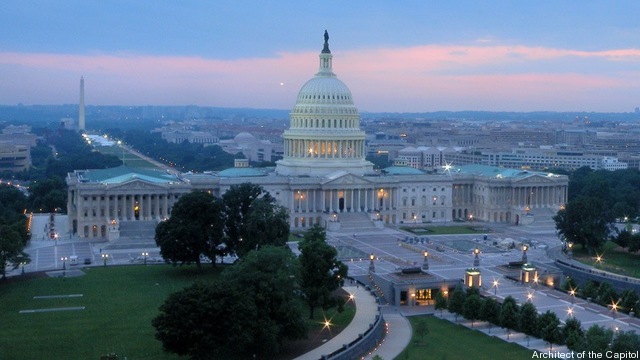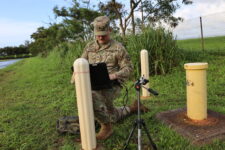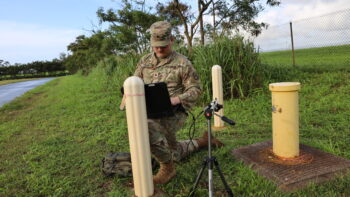
The Department of Homeland Security (DHS) has faced a great deal of scrutiny, both from the public and from Congressional leaders since its creation in 2003. Some have accused it of being dysfunctional, ineffective, and mismanaged, going so far as to call for the dissolution of the Department. While we should ask a great deal of the agency designated to protect us against terrorism and other threats, much of this criticism is misguided, as are recommendations to close the department.
We must face the reality that working to improve DHS is our only option. From a purely practical perspective, DHS is unlikely to be disestablished. We have no track record of closing cabinet departments, and it is unreasonable to expect Congress to assume the political risk associated with pursuing the elimination of the organization designed to protect the homeland. Most importantly, we must acknowledge that, strategically, DHS is too vital to simply do away with.
As we move into the next decade, we must accept that the threats we face going forward will not be from conventional armies, but from transnational actors that will seek to exploit the freedoms and norms of our open society. These threats will take a variety of forms, whether they be smuggling, terrorism, cyber-crime, or any other activity that seeks to undermine the power of the institutions we rely upon. Protecting the nation in this new era demands an entity dedicated to coordinating the multi-agency efforts required to provide effective security against such threats. As one homeland security official stated, “there are few single agency problems today and there are even fewer single agency solutions.” By far the most important role DHS fills is as leader and coordinator of this larger enterprise.
But this is hard work. The ddepartment has arguably the broadest and most disparate array of responsibilities of any government agency. DHS was created from a grab-bag of 22 existing agencies, necessitating an unheard-of level of coordination across the department. In addition to this internal coordination, DHS has had to navigate its way through a maze of state laws to work with local partners, while at the same time cooperating with private industry which owns 85% of all the critical infrastructure DHS is directed to protect. Many of the agency’s perceived failings can be attributed to the natural growing pains inherent to any young organization faced with such incredible challenges.
For all the faults that DHS does suffer from, some of the blame lies with Congress. DHS is subject to far too many congressional masters; the agency is statutorily obligated to report to 108 different Congressional committees and subcommittees. It has been estimated that DHS employees spent 66 complete work years in 2009 responding to Congress. Experts continually cite congressional oversight reform as critical to the success of DHS and have repeatedly recommended limiting oversight to two committees. Former Homeland Security Secretary Tom Ridge testified as early as 2004 that the number of committees DHS must report to is overly burdensome, yet little has been done to streamline the process.
On top of the cacophony of congressional messages and masters DHS also suffers from a national failure to set clear or realistic policies. For instance, DHS is expected to secure the nation’s borders, yet national leadership has instituted no comprehensive border or immigration policy. How can DHS build the long-term capacity to fulfill its border security mission if it has no clear guidance as to what the mission is? Zero-failure constructs, such as the one under which the Transportation Security Administration has been forced to operate, have been equally problematic. The unrealistic expectation that TSA should be able to stop every threat has led to policies based on the premise that every passenger is a potential terrorist.
The American public also must embrace the role of DHS. In this vein, we must discard the notion that the government can and will be able to protect us from all terrorist threats. While the accuracy of the concept that “we have to be successful all the time while terrorists only have to be successful once” is debatable, the fact that it has led us to embrace a zero failure mentality that fuels bad policy is not. The truth remains that government cannot protect all people from all things.
The nature of homeland security compounds the problem. In the performance of its duties DHS personnel interact with the American public in a way that constantly tests the balance between security and privacy. Whether it is airport security screening or domestic information sharing, DHS routinely finds itself in the cross-hairs of the debate between security and privacy – a debate that will only grow as the United States positions itself to engage 21st Century threats.
On the one hand the department is expected to keep the nation safe from all terrorist attacks, while on the other it must do so without being perceived as violating individual rights or presenting an inconvenience to the public at-large. For DHS to succeed, we must temper our expectations, aligning them with the reality that additional security may come at a price, both in terms of money and civil liberties, that we may not be willing to pay. Finding this balance will require robust public debate — one that Congress must lead and the American public must participate in.
In the face of these obstacles, DHS has done well strategically in some areas. The Department has been successful in improving joint operations among its many components. For example, Project Seahawk, an effort to improve port security, has effectively brought together multiple federal entities under one mission. The department has improved its relationship with local agencies through programs such as the Nationwide Suspicious Activity Reporting initiative.
Such cooperation at the operational level may pay dividends higher up the chain of command as seasoned field operators bring their experience to Washington as part of the career track. DHS also has made great strides in the integration of its acquisition system. Entities within DHS have effectively collaborated on joint purchasing strategies to maximize their savings on a wide range of acquisitions. While this area still requires work, a great deal of redundancy in procurements by various DHS entities has been reduced.
In order for the department to realize its full potential, we must avoid treating DHS as a political entity, and instead support the agency’s evolution. Until it is given the support it both needs and deserves the Homeland Security Department won’t be a truly effective and comprehensive homeland security enterprise.
Rick “Ozzie” Nelson, the newest member of the AOL Board of Contributors, is a former Navy helicopter pilot with over 20 years operational and intelligence experience, including assignments at the National Security Council and the National Counterterrorism Center. He is a senior fellow at the Center for Strategic and International Studies.
The terror of war, a helo crash mystery and the business of defense: 5 Middle East stories from 2024
From eye-witness accounts of the Israeli invasion of Lebanon to a rare appearance of Iranian weapons at a foreign arms expo, there’s a selection of Breaking Defense’s Middle East coverage.

























